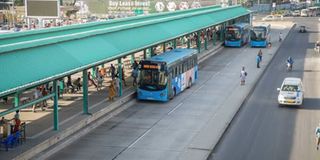Consider operators of upcountry buses for BRT role, government tells Latra

What you need to know:
- BRT Phase I still requires 170 buses to operate efficiently, and 500 buses are needed to begin operations for BRT Phase II on the Mbagala route.
Dar es Salaam. The government has urged the Dar es Salaam Rapid Transit Agency (Dart) and Udart to collaborate on integrating upcountry operators into the Bus Rapid Transit (BRT) system to enhance commuter services rather than waiting for foreign investors.
The initiative, outlined by the minister of State in the Office of the President (Regional Administration and Local Government Authorities), Mr Mohamed Mchengerwa, in Dar es Salaam yesterday, seeks to diversify the BRT fleet.
It also seeks to improve transportation efficiency and ensure that the growing demand for public transit in Dar es Salaam is met with reliable and accessible options for all Tanzanians.
Speaking during the official launch of smart cards and smart gates at BRT stations in Dar es Salaam, Mr Mchengerwa said the commencement of electric-powered train services on the Standard Gauge Railway (SGR) between Dar es Salaam and Dodoma via Morogoro has affected some upcountry business operators.
As a result, it would be considered to operate within the BRT corridor.
“The issue of buses has been discussed for a long time. BRT Phase I still requires 170 buses to operate efficiently, and 500 buses are needed to begin operations for BRT Phase II on the Mbagala route.
Ensure that the buses are procured by December this year,” he said.
Mr Mchengerwa said: “The upcountry bus operators, who have been transporting passengers for years and years, can work efficiently in BRT corridors.
As such, call local operators to invest in the BRT instead of waiting for foreign investors.”
He said it would make a lot of sense to ensure that challenges facing the BRT were resolved before extending such services to Arusha, Dodoma and other major cities.
The minister’s statement comes at a time when bus operators and Latra were reporting a drop in passenger numbers on the Dar es Salaam-Dodoma route since the start of electric-powered train services.
The Land Transport Regulatory Authority (Latra) director of road transport at Latra, Mr Johansen Kahatano, was recently quoted in this paper as saying that the bus business has drastically gone down.
He said two weeks before the commencement of electric-powered train services, they conducted a survey for the Dar es Salaam-Morogoro route. The survey centred on the total frequency of buses tracked through the Vehicle Tracking System (VTS).
“We realised that a bus that used to start from Dar es Salaam to Morogoro and then returns from Morogoro to Dar es Salaam and once again goes back to Morogoro from Dar es Salaam (three trips) has reduced the trips to only two (Dar es Salaam-Morogoro and back to Dar es Salaam only),” he said recently.
Speaking about the launched smart cards, Mr Mchengerwa termed them a technological advancement that enables the payment and collection of fares online.
The system, he said, would revolutionise the provision of the service for Tanzanians.
“For a long time, commuters were used to long queues and change-related issues. Thus, this system is to save time and eliminate queues.
The most important thing is to ensure cards are available and accessible whenever a customer wants to buy them,” he said.
Dart’s chief executive, Athumani Kihamia, said the launch will save time and encourage cashless transactions. “Passengers can top up balance at any BRT station.
I urge technology operators to have efficient operations, especially that smart cards will increase revenue and reduce fraud,” he said.
The chairman of the Parliamentary Local Government Affairs Committee, Mr Justine Nyamoga
said the launch of cards should go hand in hand with bringing in new buses to simplify the transportation of people.
“Last time, when the committee visited Dart, we ordered the authority to bring smart cards to reduce complaints from Tanzanians.
Today, we are happy to see Dart implementing one of our directives and promoting cashless fare collection,” he said.
He noted that so far various BRT roads were under construction, and it was important for Dar es Salaam residents that the buses must be brought on time.
The first phase from Kimara-Mwisho to the city centre faces an acute shortage of buses, which causes congestion in BRT stations and inside buses.




